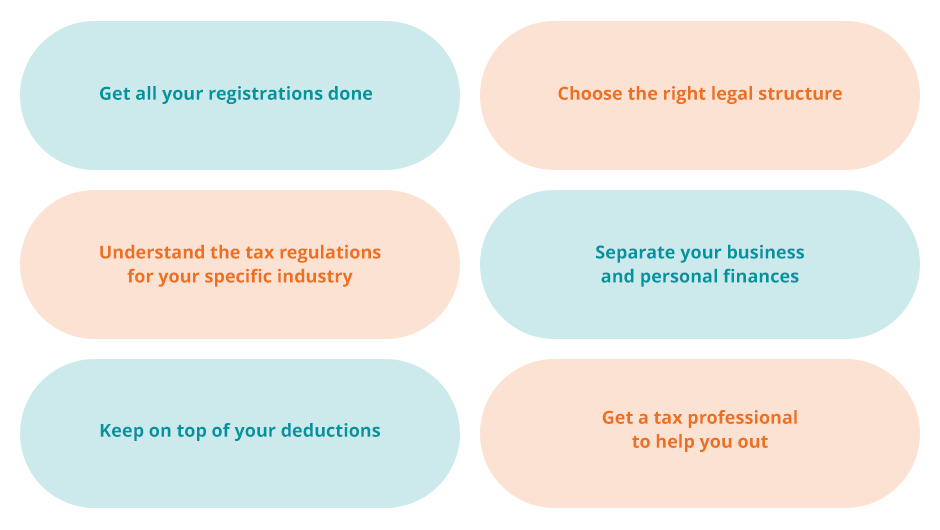TABLE OF CONTENTS
- 1. Get all your registrations done
- Complete your ABN registration
- Register for your taxes
- Register for licences and permits
- 2. Choose the right legal structure
- 3. Understand the tax regulations for your specific industry
- 4. Separate your business and personal finances
- 5. Keep on top of your deductions
- 6. Get a tax professional to help you out
If you’ve started or are starting a new business, there’s lots of decisions to be made that can have a huge impact on the day-to-day running of your business. Getting on top of the tax obligations and regulations that apply to your business can seem overwhelming. That’s why we’ve put together a list of 6 tax help tips for new businesses.
1. Get all your registrations done
Complete your ABN registration
One of the first things you’ll need to do to get your business started is to apply for ABN (Australian Business Number). An ABN is a unique 11-digit number that identifies your business to the government and community. Applying for an ABN is free and can be easily done online here.
Register for your taxes
There are a number of different taxes that you may be required to register for as part of running a business, such as:
- Goods and Services Tax (GST)
- Pay As You Go (PAYG) withholding.
Whether you need to register for these taxes will depend on your turnover and the nature of your business. Check out for the business.gov.aufor more information.
Register for licences and permits
There are many additional industry related licences, permits and regulations you must also follow. These can include things like food preparation, playing music, displaying signage etc. Search the Australian Business Licence and Information Service (ABLIS) website to find out what licences and permits you need for your industry.
2. Choose the right legal structure
The structure of your business plays an important role in determining your tax obligations so it’s important to get it right from the beginning. There are 4 types business structures commonly used in Australia including sole trader, partnership, company and trusts each with different set-up and maintenance costs, reporting obligations and tax rates.
Keep in mind a sole trader can transfer their business to a company without being hit by capital gains tax on the transfer of the assets, so you’re not locked in forever if you think a different structure could work better for your business down the track.

3. Understand the tax regulations for your specific industry
One of our key small business tax help tips is to be aware of the unique legal and operational requirements for your specific industry. For example, the construction industry has additional tax regulations including:
- Personal Services Income (PSI)
- Taxable Payments Reporting (TPAR)
You can check out these industry fact sheets for the specific information that applies to your business.
4. Separate your business and personal finances
When you’re starting a business, you should always set-up a separate business bank account. This will give clearer picture of your business finances and cash flow, help you save you time doing your BAS and income tax returns and presents your business as more professional to customers and suppliers.
It will also help you maximise your deductions a tax time because you won’t have to spend time sorting through one account to separate your business and personal transactions!
5. Keep on top of your deductions
Most expenses incurred in running a business can be claimed as a deduction. Keeping track of your deductions is easy if you do it often. Get in the habit for recording receipts and logging travel in real-time. Your accounting software can help you do this on the go so you’re not left with a massive shoebox of receipts come tax time.
You should also remember ATO Assistant Commissioner Mathew Umina’s 3 small business tax help tips for managing deductions:
- The money must have been spent for your business not yourself
- If you use something for business and private purposes, you can only claim the portion that is related to your business
- You need a record to prove it
6. Get a tax professional to help you out
When you’re just starting out it’s a good idea to get in touch with a tax professional to help you get stet-up and ensure you have all the right information from the beginning. We have a range of tax advisors that can help you with whatever you need. Simply search for one in you local area here.
You can also check out the ATO and business.gov.au small business sites as they have plenty of resources to help small business just starting out.

